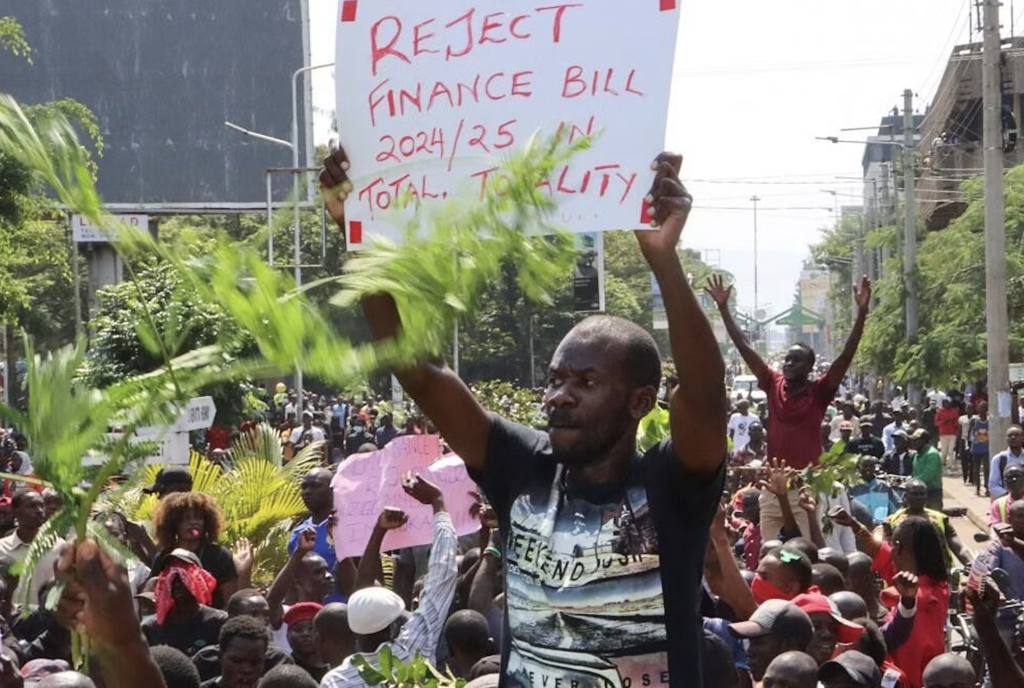In recent weeks, Kenya has witnessed a remarkable display of patriotism from Gen Z and millennials, particularly during and after the anti-tax protests. These protests were not merely about opposing new tax measures but were a powerful expression of civic duty, unity, and concern for the country’s future. Gen Z has embodied the spirit of patriotism throughout the protests while focusing on addressing their grievances.
Gen Z leveraged their digital fluency to organize protests against the proposed tax hikes. Social media platforms like X (formerly Twitter), TikTok, and Facebook became essential tools for rallying support, sharing information, and coordinating activities. While these platforms have primarily been used for content creation and entertainment, they were crucial in this context.
The hashtag #RejectTheFinanceBill became a trending topic, drawing national and international attention to their cause. Their ability to harness digital tools highlights a modern form of patriotism where digital activism plays a key role in civic engagement. Through these platforms, Gen Z not only raised awareness but also held live discussions and forums, such as X Space and TikTok Live, to educate the public on the implications of the new tax policies and the contents of the Bill.
President Ruto responded by holding an X Space as requested by Gen Z.
The protests saw Gen Z organize at the grassroots level across 34 out of 47 counties, demonstrating significant organization and leadership. They coordinated peaceful marches, sit-ins, and rallies, emphasizing non-violent protest with only placards and Kenyan flags.
Despite lacking formal leadership, Gen Z displayed exceptional discipline and organizational skills. The mobilization led to Kenya’s largest simultaneous protests in major towns. Gen Z responded to the call that their country’s future and their lives are in their hands and that confronting bad governance is a collective responsibility. This approach maintained public support from the older generation and ensured their message was heard without violence or disorder.
By advocating for peaceful demonstrations, Gen Z showed a mature understanding of civic responsibility and the importance of maintaining public order while voicing dissent. This earned them admiration and support from various societal segments, further strengthening their cause.
- Raila faces Gen Z backlash over dialogue bid
- Ruto fires his entire Cabinet days after Gen Z protests
- Why today’s Budget vote will make or break Kenya
At the core of the anti-tax protests was a deep concern for social and economic justice. Gen Z highlighted how the proposed tax measures would disproportionately affect poor and marginalized communities, arguing that the tax hikes would worsen the cost of essential goods and services, exacerbating the gap between rich and poor.
This focus on equity and justice reflects their inclusive and empathetic form of patriotism. They fought not only for their own future but also for the well-being of all Kenyans, particularly the most vulnerable to economic hardship.
Gen Z’s involvement also showcased their political engagement and willingness to hold leaders accountable. They demanded transparency and accountability from the government and questioned the rationale behind leaders’ opulence at taxpayers’ expense.
Their active participation in political discourse—through public forums, media interviews, and direct engagement with policymakers—underscores their commitment to democratic principles and governance. This level of engagement powerfully expresses their patriotic duty to ensure that the government acts in their best interest according to the Constitution of Kenya, 2010.
Building a Unified Front
One of the most notable aspects of the protests was the unity displayed by Gen Z. They transcended ethnic, religious, and socio-economic divisions to present a united front against the government. The youthful protesters emphasized that they are party-less, leaderless, tribeless, and fearless.
Medics provided free medical care to injured protesters, ensuring help was available when needed. Lawyers, guided by Law Society of Kenya (LSK) President Faith Odhiambo, offered pro bono services to those arrested.
Supporters provided water and food to protesters in the streets. When police killed peaceful protesters, Gen Z members carried the deceased covered in the Kenyan flag and contributed money through M-Changa to cover hospital bills and funeral expenses. Plans are underway to provide funds to those paralyzed by gunfire to help them adjust to their new lives.
A candlelight vigil was held to honor the fallen heroes, followed by a blood drive and a concert at Uhuru Park to celebrate their lives and mourn with their families. This solidarity amplified their message and demonstrated a collective commitment to the nation’s welfare.
By fostering a sense of national unity, Gen Z embodied a form of patriotism that values the common good over individual or group interests. Their unity not only strengthened their movement but also inspired other societal segments to join their cause.
The anti-tax protests in Kenya highlighted how Generation Z is redefining patriotism in the modern age. Through digital activism, peaceful protests, a focus on social justice, political engagement, and national unity, they have shown that patriotism involves actively working toward a just, equitable, and inclusive society.
As they continue to rise and lead, the spirit of patriotism they have embodied will undoubtedly shape Kenya’s future in profound ways.



